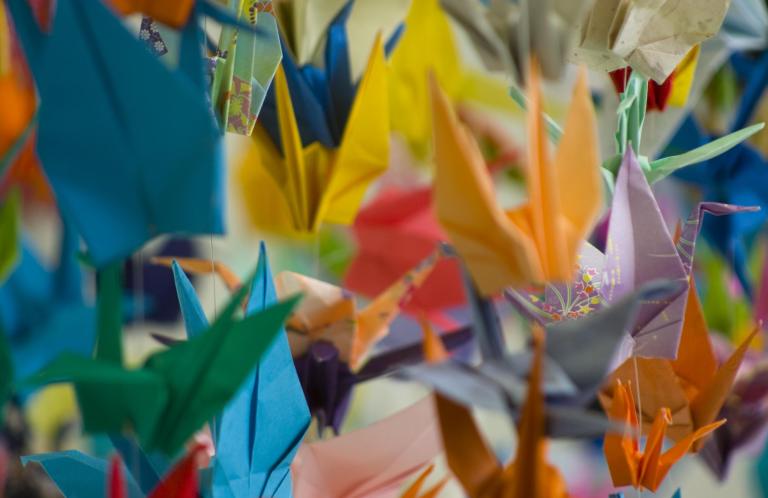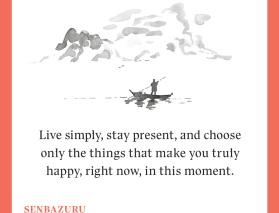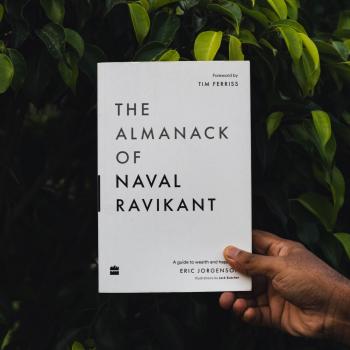
Have you ever tried origami? It’s the Japanese art of folding paper into decorative shapes and figures, usually long-necked cranes. According to mindfulness master Michael James Wong, it’s also a valuable spiritual practice, akin to meditation.
In the book Senbazuru, One Thousand Steps to Happiness, Fold by Fold, Wong details the 12 steps it takes to make a crane out of paper, accompanied by beautiful illustrations. But that is only one small aspect of the book. Between each step Wong lays out his spiritual philosophy, which might be best summed up with these three words:
“Just Slow Down”
If I was to pinpoint Michael James Wong’s mission in this life, it would be to find ways to bring more mindfulness into the world. Aside from being an author, Wong is also the founder of the London-based Just Breathe community which offers silent retreats, a quiet club, and meditation sessions, both in-person and via an app. What started out as a tiny movement now has thousands of members.
Wong believes “we are simply moving too fast” and are “in search of an experience that in fact requires a gentler pace.” Like origami, and even the reading of Senbazuru*, he recommends we slow things down. This enables us to be more attentive to, and mindful of, the people and moments that make up our lives. He explains:
Life as we know it is plagued by the glorification of busyness and, because of this, people lack meaningful human connection. I believe that an urgent shift is needed, not just in our actions, but also in our perspective. One that is slower, kinder, and unencumbered by the expectations of a fast-paced world.
What follows are 5 mindfulness tips I picked up while reading the elegantly designed Senbazuru. Wong offers a good deal more wisdom than what you see here, but these are my favorites, lessons that can help us stay on track. The words that follow are mostly his, though I have added a few of my own.
5 Mindfulness Tips from an Origami Master
Tip 1. Take a moment to just breathe. Sometimes “the best way to start is to stop.” Sit still and close your eyes for a few seconds. Open them and become aware of what is immediately in front of you. What colors, shapes and patterns do you see? Breathe and be in this moment.
Tip 2. Feeling overwhelmed? Slow down. Wong reminds us that we can only do one thing at a time, not everything at once. So “disregard the temptation to move too quickly.” Give your attention to the present moment and handle one thing at a time. (I find it helps to make a list, focusing on a single endeavor before moving on to the next.)
Tip 3. Have patience. Wong defines patience “as the practice of embracing uncertainty.” It is a part of origami and also a part of a mindful life. Our goal should be to “prolong the moments when we are calm and at ease and cultivate a trusting nature in the wisdom that naturally resides within.” There’s no need to try and resolve any challenges immediately. Let them be.
Tip 4. Learn to spend time alone. Try to find time for solitude each day, even if for 5 minutes. It gives you the chance to “breathe again, literally and figuratively.” Wong tells us that “quietude can gift us a feeling of safety, a feeling that is necessary, essential, and empowering in a busy, noisy world.” When we step away from the world, we move closer to our true selves.
Tip 5. Choose not to suffer. Wong teaches there’s a difference between pain and suffering. A physical injury causes pain. But when our heart is broken or aches, it is not pain, it is suffering. He believes that suffering is not inevitable, but a conscious choice we make. In his words, “we choose to be a victim and prolong the story.” Wong says that there are 3 steps we can take to help us relieve our suffering:
- Acknowledgement. You cannot ignore your feelings. Acknowledging your suffering is the first step to healing.
- Acceptance. Surrender to what is and what has been done. Don’t speak about it as something that was done to you, but as something that was done—and is now in the past.
- Action. “Suffering exists only if we allow the attachments of the past to become the stories of the present.” Imagine your life moving forward to a new place where the pain you feel is only a faint memory. Create a new vision for the future.
 *Senbazuru literally means 1,000 cranes. According to tradition, if a person folds a thousand paper cranes in one year, they will be gifted one special wish that will grant long life, healing from illness or injury, and eternal happiness.
*Senbazuru literally means 1,000 cranes. According to tradition, if a person folds a thousand paper cranes in one year, they will be gifted one special wish that will grant long life, healing from illness or injury, and eternal happiness.













